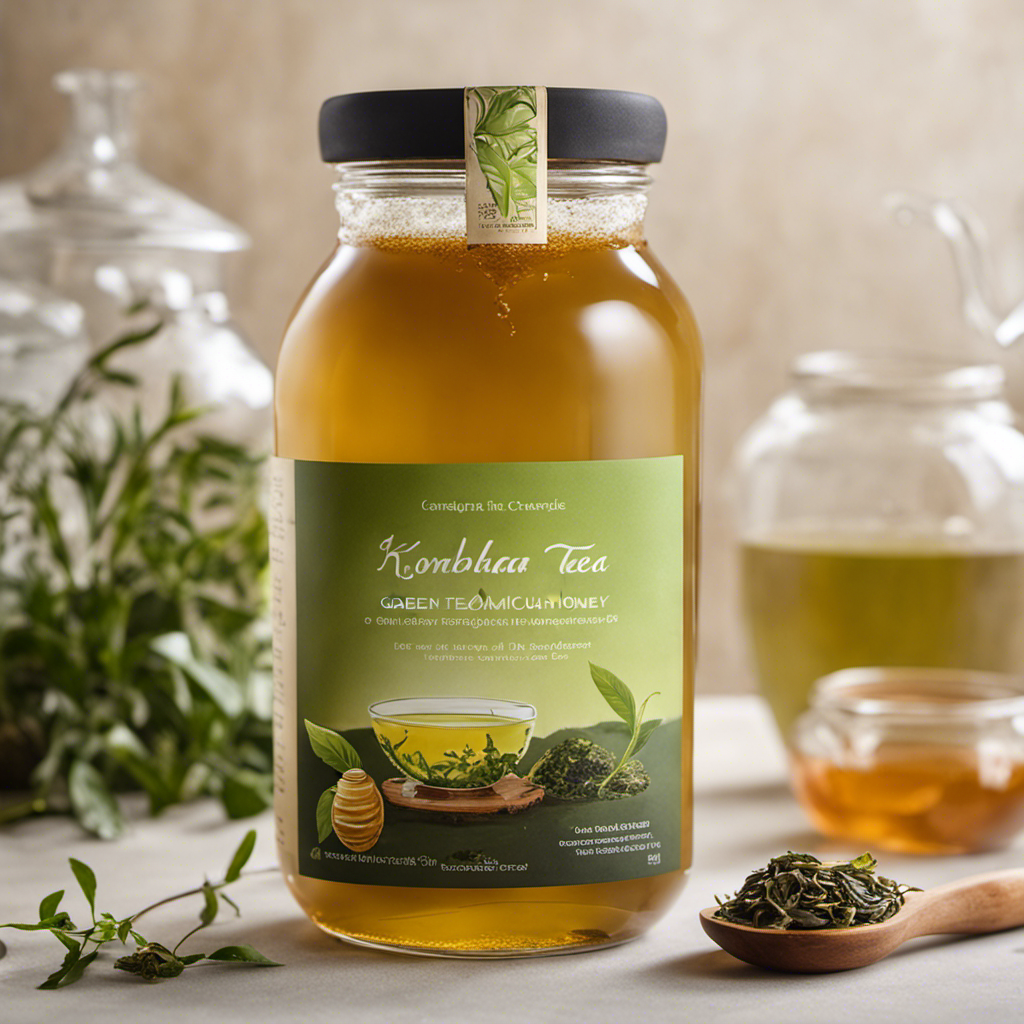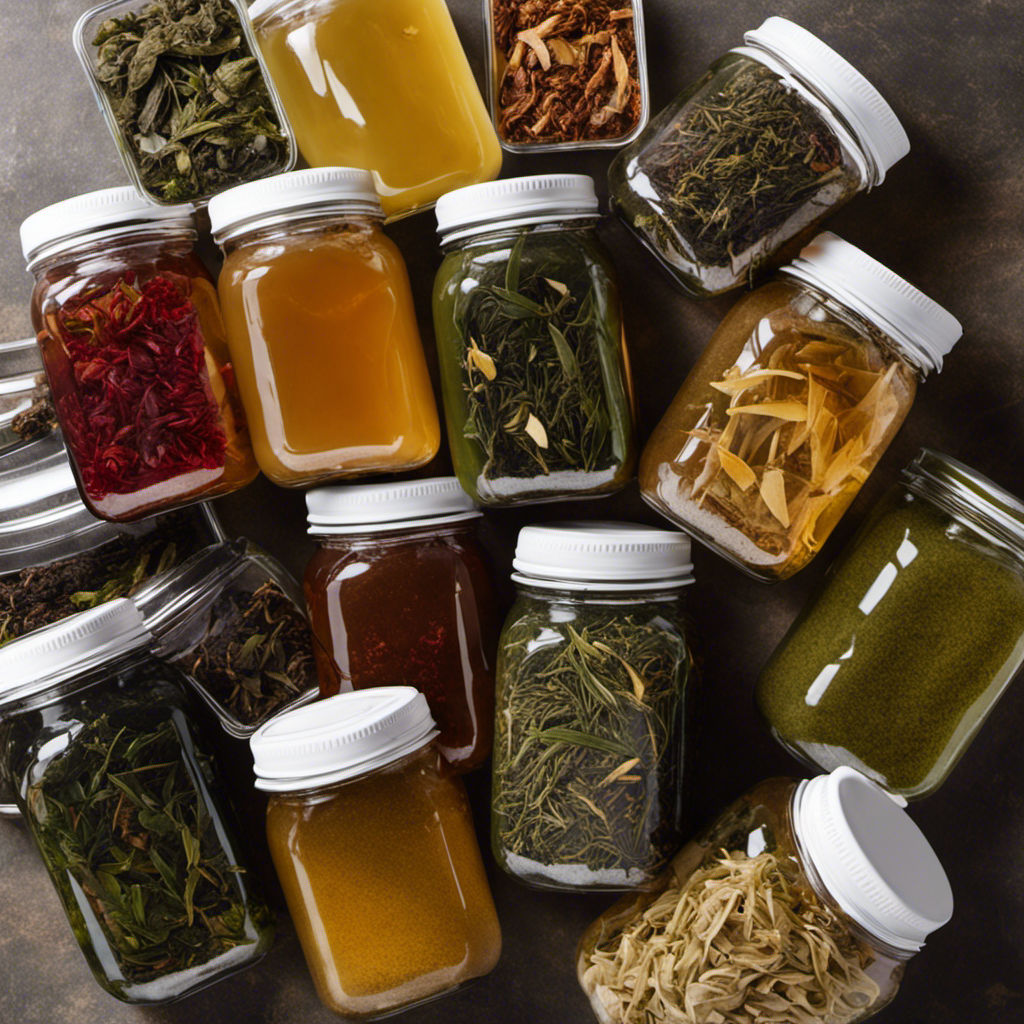Coffee, Tea and Alternatives and Health plus Fitness
Decaf Or Death: Managing Caffeine Intake

Decaf or Death: Managing Caffeine Intake – this is a topic that has been on my mind for quite some time now. As someone who loves a good cup of coffee in the morning, I often wonder about the impact of caffeine on my health. While caffeine can provide a temporary boost of energy, consuming too much can lead to health problems.
So, how can we balance our love for coffee with the need to manage our caffeine intake? In this article, I will explore the factors that affect caffeine content in coffee, safe daily limits, and how to choose the right brew to enjoy without compromising our health.
Understanding the science behind caffeine consumption is key to making informed decisions about our coffee habits. Factors such as the type of bean, brewing method, and roasting process can all impact the amount of caffeine in a single shot of coffee. However, it’s not just about the amount of caffeine we consume, but also about the safe daily limits.
Consuming too much caffeine can lead to anxiety, insomnia, and even heart palpitations. But fear not, there are ways to manage our caffeine intake without sacrificing the joy of a good cup of coffee. In this article, I will provide evidence-based tips to help you make informed decisions about your caffeine consumption.
So, let’s dive in and explore the world of decaf and beyond.
Key Takeaways
- Safe daily limits of caffeine intake vary by age and pregnancy status
- Exceeding safe daily limits can lead to adverse effects such as anxiety, insomnia, and heart palpitations
- Understanding factors affecting caffeine content in coffee can help manage caffeine intake without sacrificing flavor
- Choosing caffeine-free alternatives such as herbal teas or decaf coffee is a great option for those cutting back on caffeine.
Factors affecting caffeine content
I’ve learned that the caffeine content in one shot of coffee can vary depending on factors such as the type of bean, roasting process, and brewing method.
For instance, Coffea Robusta has more caffeine than Coffea Arabica, and lighter roasts have more caffeine than darker ones. Additionally, the temperature and brewing method can also impact caffeine levels, with an Americano having more caffeine than espresso due to its brewing style.
The role of temperature and brewing method in caffeine levels is important to note. For example, cold brew coffee has a lower caffeine content compared to hot brewed coffee due to the longer brewing time and lower temperature. Similarly, espresso-based beverages like lattes or cappuccinos may have varying caffeine content depending on the number of shots used.
Understanding these factors can help individuals better manage their caffeine intake without sacrificing flavor.
Safe daily limits
Interestingly, the safe daily limit for caffeine intake varies depending on age and pregnancy status. Children and teenagers are recommended to consume no more than 100mg per day. Pregnant women are advised to consume no more than 200mg per day, while adults should limit their intake to no more than 400mg per day. Exceeding these limits can lead to adverse effects such as palpitations, blood pressure issues, and insomnia.
Knowing these limits can help individuals manage their caffeine intake and prevent negative consequences. To help manage caffeine intake, there are a few things individuals can do. Firstly, consider the benefits of caffeine-free alternatives such as herbal teas or decaf coffee. These alternatives provide a similar taste experience without the caffeine content.
Additionally, for pregnant women, managing caffeine intake may be particularly important. In this case, opting for caffeine-free alternatives or limiting caffeine intake to below the recommended limit can help prevent any potential negative effects on the developing fetus. Ultimately, understanding safe daily limits of caffeine intake and making informed choices can help individuals manage their caffeine intake and maintain good health.
Choosing the right brew
When selecting my coffee brew, I consider factors such as brewing method, bean type, roast level, and temperature to ensure I get the perfect balance of flavor and caffeine.
I prefer light- or medium-roasted coffee as they contain higher caffeine content than darker roasts. However, I also make sure to choose blends and roasting techniques that can help me manage my caffeine intake without sacrificing flavor.
Aside from choosing the right roast level, I also explore flavor alternatives and brewing techniques to make my coffee experience more enjoyable. I love trying out different espresso-based beverages such as cortados or flat whites, which have lower caffeine content than a full shot of espresso.
I also enjoy drinking herbal teas and decaf options, which are great alternatives for those cutting back on caffeine. Ultimately, choosing the right brew requires a bit of experimentation and knowledge about the different factors that affect caffeine content and flavor in coffee.
Frequently Asked Questions
What is the difference between caffeine content in a shot of espresso and a regular cup of coffee?
When comparing the caffeine content in a shot of espresso and a regular cup of coffee, there are a few factors to consider.
Generally speaking, one shot of espresso contains less caffeine than a regular cup of coffee. However, this can vary depending on the type of bean, brewing method, and other variables.
Coffea Robusta beans have more caffeine than Coffea Arabica beans, and lighter roasts have more caffeine than darker ones. An Americano, which is made by adding hot water to espresso, has more caffeine than a straight shot of espresso.
However, it’s important to note that different blends and roasting techniques can help manage caffeine intake without sacrificing flavor. For those looking to cut back on caffeine, decaf options are available and can be just as tasty as regular coffee.
Taste analysis has shown that the Swiss water process is a safer and more eco-friendly way to decaffeinate coffee.
Overall, understanding the caffeine comparison between espresso and coffee is important for managing caffeine intake.
Can the temperature of the water used to brew coffee affect the caffeine content?
Brewing methods play a crucial role in caffeine extraction, but can the temperature of the water used to brew coffee affect the caffeine content?
The answer is yes, as higher temperatures typically lead to greater caffeine extraction. This is due to the fact that caffeine is more soluble at higher temperatures, allowing it to be more easily extracted from the coffee beans.
However, it’s important to note that excessively high temperatures can be detrimental to the flavor of the coffee, resulting in a bitter taste. Therefore, it’s important to find the right balance between temperature and brewing time to ensure optimal caffeine extraction and a delicious cup of coffee.
Are there any health benefits to consuming caffeine in moderation?
As someone who enjoys a cup of coffee in the morning, I’ve always been curious about the health benefits of consuming caffeine in moderation.
Studies have shown that moderate caffeine intake can potentially have positive effects on cognitive function, mood, and physical performance.
However, it’s important to note that consuming too much caffeine can lead to negative effects on sleep, such as difficulty falling asleep, decreased sleep quality, and daytime sleepiness.
It’s recommended to limit caffeine intake to no more than 400mg per day for adults, and to avoid consuming caffeine close to bedtime.
Overall, when consumed in moderation, caffeine can provide some benefits, but it’s important to be mindful of its effects on sleep.
How does the caffeine content in tea compare to coffee?
As an avid coffee drinker, I often wonder how the caffeine content in tea compares to coffee. The answer depends on various factors, such as the type of tea and brewing method.
Generally, tea contains less caffeine than coffee, with an average cup of black tea containing around 50mg of caffeine, while a shot of espresso has approximately 63mg. However, the actual caffeine content can vary widely depending on the type of tea and how long it is steeped.
Additionally, tea has various health benefits, such as reducing the risk of heart disease and stroke, improving brain function, and reducing the risk of certain types of cancer. So, while coffee may have more caffeine, tea has its own unique advantages and can be a great alternative for those looking to manage their caffeine intake while still enjoying a hot beverage.
Is it possible to completely remove caffeine from coffee without sacrificing taste?
I’ve always been curious about whether it’s possible to completely remove caffeine from coffee without sacrificing taste. After some research, I learned that there are caffeine-free coffee alternatives available that are made by roasting and brewing coffee beans that have been decaffeinated using various methods.
One of the most common methods is called the Swiss water process, which uses water to remove caffeine from the beans while preserving their flavor. Another method involves using solvents like ethyl acetate or methylene chloride to extract caffeine. However, some people are wary of these methods due to safety concerns.
While decaf coffee may not have as much of a kick as regular coffee, it can still provide a delicious and satisfying coffee experience without the negative effects of caffeine. Knowing about the decaffeination process and caffeine-free coffee alternatives can help those looking to manage their caffeine intake without sacrificing taste.
Conclusion
In conclusion, managing caffeine intake is all about finding the right balance. Understanding the factors that affect caffeine content in your coffee can help you make informed decisions about your caffeine consumption. These factors include the type of bean, brewing method, and roasting process.
It’s important to keep in mind that while caffeine can provide a temporary boost of energy, consuming too much can have negative effects on your health. To stay within safe daily limits, it’s recommended to limit caffeine intake to no more than 400 milligrams per day.
This can be achieved by choosing decaf coffee or herbal teas as alternatives to regular coffee. Remember, sometimes less is more, and finding a balance between enjoying your favorite beverage and taking care of your health is key. As the saying goes, ‘everything in moderation.’
So, make sure to listen to your body and adjust your caffeine intake accordingly to maintain a healthy lifestyle.
Noah, the Editor-in-Chief at Cappuccino Oracle, plays a pivotal role in shaping the voice and vision of our renowned platform. With an unwavering passion for coffee, coffee alternatives, and tea, Noah leads Cappuccino Oracle towards new horizons in the realm of coffee journalism.
Beyond his professional responsibilities, Noah serves as a mentor and guiding force for his team. His dedication to journalistic excellence and genuine love for coffee, coffee alternatives, and tea continue to inspire and motivate the Cappuccino Oracle family. In the ever-evolving world of these beverages, Noah’s leadership ensures that our platform remains at the forefront, delivering enlightening and enjoyable content to our readers worldwide.
Coffee, Tea and Alternatives and Health plus Fitness
Mastering the Art of Boosting Metabolism Through Coffee

Being a coffee enthusiast, I have often pondered about the potential benefits of my favorite morning pick-me-up. It turns out, coffee can do so much more than just help me wake up!
In this article, I’ll share with you the secrets to mastering the art of boosting metabolism through coffee. We’ll explore the importance of fresh, high-quality beans, grinding your own for maximum effectiveness, and why avoiding processed coffee is crucial.
Get ready to discover how to enhance your coffee experience for optimal metabolism-boosting results.
Key Takeaways
- Fresh, high-quality beans retain flavor and aroma when stored properly
- Grinding your own beans allows for consistent grind size and optimal flavors
- Freshly brewed coffee made from whole beans is essential for boosting metabolism
- Sweetener-free coffee allows appreciation of natural flavors and aromas
The Importance of Fresh, High-Quality Beans
I absolutely believe that the key to a truly satisfying cup of coffee lies in using fresh, high-quality beans. When it comes to bean storage techniques, it’s important to keep them in an airtight container away from light, moisture, and heat. This helps preserve their flavor and aroma for a longer period of time.

As for the impact of roasting on coffee metabolism boosting, studies have shown that darker roasts have a higher caffeine content and can potentially increase metabolism. However, it’s worth noting that the difference isn’t significant enough to solely rely on coffee for weight loss. Regular exercise and a balanced diet are still essential.
Now, let’s move on to the next section where we’ll discuss grinding your own beans for maximum effectiveness in boosting metabolism.
Grinding Your Own Beans for Maximum Effectiveness
Grinding my own beans allows me to control the coarseness, resulting in a more flavorful and effective cup of coffee. When it comes to grinding techniques, finding the right roast is crucial.
Here’s how grinding your own beans can enhance your coffee experience:
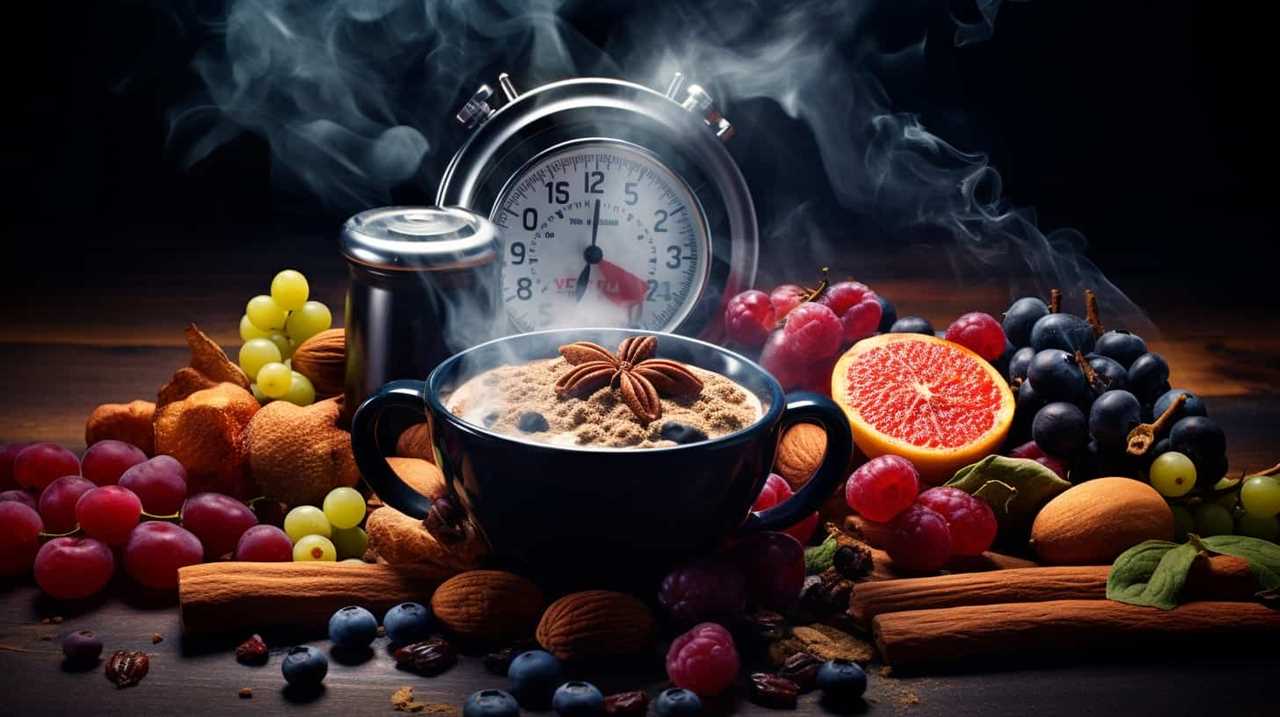
-
Consistency: By grinding your own beans, you can achieve a consistent grind size, which is essential for extracting the optimal flavors from the coffee grounds.
-
Freshness: Pre-ground coffee can quickly lose its freshness and aroma. Grinding your beans just before brewing ensures that you’re getting the freshest cup possible.
-
Customization: Different brewing methods require different grind sizes. By grinding your beans at home, you can adjust the coarseness to match your preferred brewing method, whether it’s a French press, pour-over, or espresso.
Avoiding Processed Coffee for Optimal Metabolism Boosting
Drinking freshly brewed coffee made from whole beans is essential for achieving optimal metabolism boosting.
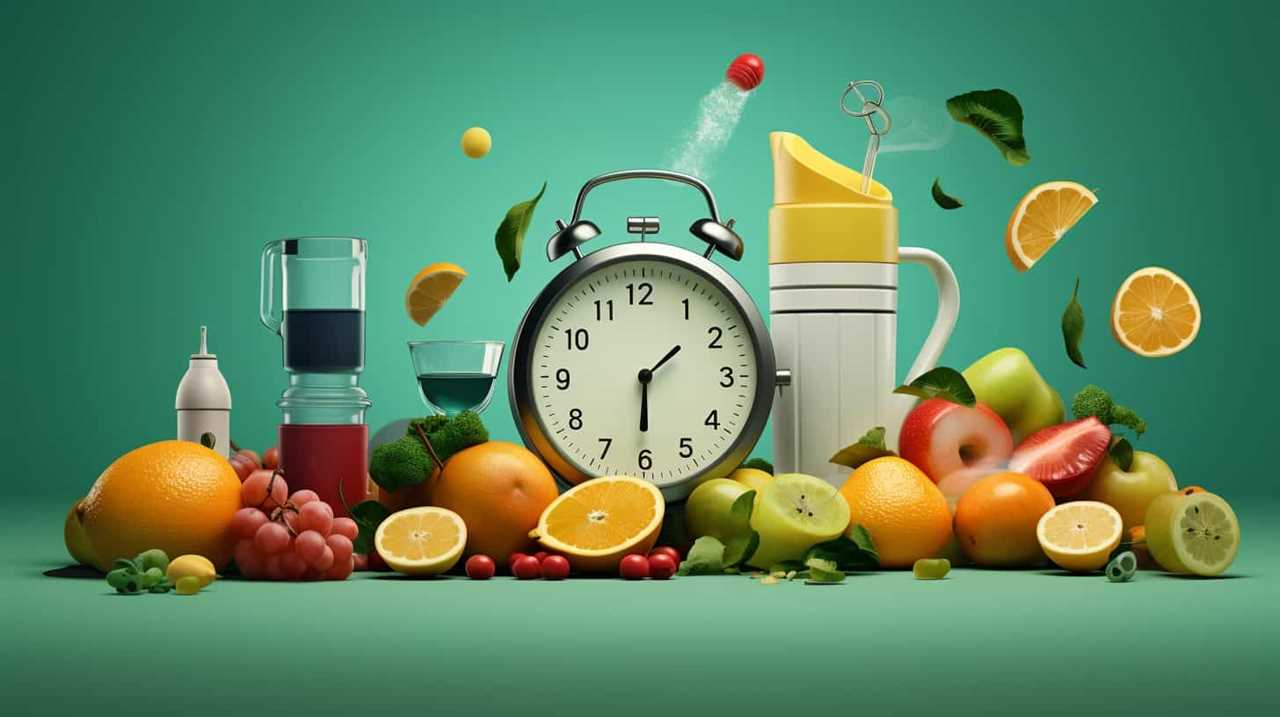
When it comes to choosing the right coffee beans, it’s important to consider whether to go for organic or conventional options. Organic coffee is grown without the use of synthetic pesticides and fertilizers, making it a healthier choice for both our bodies and the environment. Conventional coffee, on the other hand, may contain residues of these chemicals, which can have negative effects on our metabolism.
Additionally, the impact of caffeine on metabolism shouldn’t be overlooked. Caffeine has been shown to increase metabolic rate and fat oxidation, aiding in weight management. However, it’s important to consume coffee in moderation and be mindful of any potential negative effects, such as sleep disruption or increased heart rate.
Sweetener-Free: Why Drinking Coffee Without Additives Is Key
Using sweetener-free coffee allows me to fully appreciate the natural flavors and aromas of the beans. Not only does it enhance my coffee-drinking experience, but it also has several health benefits. Here are three reasons why drinking coffee without additives is key:
-
Preserves the true taste: Adding sweeteners masks the natural flavors of coffee. By going sweetener-free, you can savor the rich, complex taste of the beans and truly enjoy the nuances of different coffee varieties.

-
Reduces calorie intake: Sweeteners can add unnecessary calories to your daily diet. By skipping the additives, you can enjoy your coffee guilt-free and maintain a healthier lifestyle.
-
Avoids potential health risks: Some sweetener alternatives may have adverse effects on our health. By opting for sweetener-free coffee, you can minimize the potential risks associated with artificial additives.
Balancing Coffee Consumption for Sustainable Results
I find that moderation is key when it comes to achieving sustainable results with my coffee consumption. Understanding my caffeine tolerance and timing my coffee intake appropriately are crucial factors in maintaining a healthy relationship with this beloved beverage.
Caffeine tolerance varies from person to person. It’s important to listen to our bodies and be mindful of our individual limits. Consuming excessive amounts of caffeine can lead to negative side effects such as jitteriness, increased heart rate, and disrupted sleep patterns. It’s recommended to limit daily caffeine intake to 400 milligrams, which is roughly equivalent to four cups of brewed coffee.

The timing of coffee consumption also plays a significant role in maximizing its benefits. Consuming coffee in the morning can help jumpstart metabolism and enhance cognitive function throughout the day. However, it’s advised to avoid drinking coffee too close to bedtime, as it may interfere with sleep quality.
Frequently Asked Questions
Can I Achieve the Same Metabolism-Boosting Benefits With Instant Coffee?
Can I achieve the same metabolism-boosting benefits with instant coffee?
Instant coffee alternatives mightn’t have the same impact on metabolism as freshly brewed coffee. The brewing method plays a significant role in unlocking the metabolism-boosting properties of coffee.
Instant coffee is usually made through a different process that can affect its chemical composition. While instant coffee may still provide a caffeine boost, it may not have the same impact on metabolism as freshly brewed coffee.

How Does the Freshness of Coffee Beans Affect Its Metabolism-Boosting Properties?
When it comes to boosting metabolism, the freshness of coffee beans can make a real difference. Roasting the beans affects their metabolism-boosting properties, so the type of coffee bean you choose matters.
Freshly roasted beans contain higher levels of compounds like chlorogenic acid, which can increase metabolic rate. So, if you’re looking to master the art of boosting metabolism through coffee, opt for freshly roasted beans to maximize the effects and get that extra kickstart to your day.
Is It Necessary to Grind Coffee Beans Right Before Brewing to Maximize the Metabolism-Boosting Effects?
To maximize the metabolism-boosting effects of coffee, it’s necessary to grind the beans right before brewing. Grinding techniques play a crucial role in releasing the coffee’s flavors and active compounds, including those that boost metabolism.
What Additives or Sweeteners Should I Avoid Adding to My Coffee to Optimize Metabolism-Boosting Benefits?
To optimize the metabolism-boosting benefits of coffee, it’s best to avoid adding certain additives or sweeteners. Natural sweeteners like stevia or honey are great options. They provide sweetness without adding extra calories or negatively impacting metabolism.

As for coffee roast level, it doesn’t significantly impact its metabolism-boosting properties. So feel free to enjoy your preferred roast level while reaping the benefits of a boosted metabolism.
Is There a Recommended Amount of Coffee Consumption per Day to Maintain Sustainable Metabolism-Boosting Results?
There isn’t a specific recommended daily intake of coffee to maintain sustainable metabolism-boosting results.
However, research suggests that moderate caffeine consumption can have positive effects on metabolism.
It’s important to listen to your body and not exceed your personal tolerance for caffeine.

Drinking too much coffee can lead to negative side effects like anxiety or disrupted sleep.
It’s best to enjoy coffee in moderation and find the right balance for your individual needs.
Conclusion
In conclusion, mastering the art of boosting metabolism through coffee requires fresh, high-quality beans, grinding your own beans, avoiding processed coffee, and drinking it without additives.
Did you know that a study found that drinking three cups of coffee a day can increase metabolism by up to 11%? This statistic not only offers a practical and evidence-based approach to improving metabolism, but it also evokes excitement and motivation for coffee lovers seeking sustainable results.

So go ahead, enjoy your coffee and reap the benefits!
In the vast and diverse world of coffee, coffee alternatives, and tea, Olivia has found her calling. As an author and a dedicated coffee and tea aficionado, her work for Cappuccino Oracle reflects her profound love and understanding of the intricate complexities found within these beverages. Olivia’s passion for the subject serves as both a catalyst for her creativity and a connection point with her audience.
Olivia’s appreciation for coffee, coffee alternatives, and tea blossomed at an early age. She discovered that these beverages invigorated her senses and stimulated her creative spirit. From the nuanced flavors of single-origin roasts to the captivating narratives intertwined with coffee, coffee alternatives, and tea trade and culture, Olivia found an unlimited source of inspiration in her daily cup.
Her love for these beverages and her talent for storytelling eventually converged at Cappuccino Oracle. As an author, Olivia’s mission is to illuminate the intricate tapestry that makes up the world of coffee, coffee alternatives, and tea. Her articles span a diverse range of topics, encompassing everything from the unique flavors of different brews to the sociocultural history intertwined with their cultivation and consumption.
Coffee, Tea and Alternatives and Health plus Fitness
Mastering the Fine Art of a Metabolism-Boosting Coffee Routine

I have always enjoyed beginning my day with a cup of coffee, but recently I found a method to enhance it further – by incorporating it into a metabolism-boosting routine.
By following a few simple steps, I’ve been able to not only enjoy my morning coffee, but also support my body’s natural fat-burning capabilities.
In this article, I’ll share the secrets to mastering the fine art of a metabolism-boosting coffee routine, so you can start your day off on the right foot too.
Key Takeaways
- Sticking to a two-cup-a-day coffee schedule keeps you energized and focused throughout the day.
- Opting for organic coffee is a more sustainable and environmentally-friendly choice.
- Limiting sugar and dairy intake has several health benefits.
- Including a healthy snack, like a piece of fruit, in your mid-morning routine boosts energy levels and curbs hunger.
Setting a Daily Coffee Intake Schedule
I’ve found that sticking to a two-cup-a-day coffee schedule keeps me energized and focused throughout the day. Creating a coffee ritual has become an integral part of my daily routine.

It’s not just about the caffeine kick, but also the process of making and enjoying my coffee that sets the tone for the day. Experimenting with different brewing methods has allowed me to discover my preferred flavors and strength.
Whether it’s a French press, pour-over, or espresso machine, each method brings a unique taste to my cup. I’ve learned that the key to a successful coffee routine is finding what works best for you.
Opting for Organic Coffee
Having researched the benefits of organic coffee, I’m now considering switching to a more sustainable and environmentally-friendly option. Organic coffee is grown without the use of synthetic fertilizers or pesticides, which reduces the impact on both the environment and our health.
Additionally, opting for fair trade coffee ensures that farmers receive fair wages and work in safe conditions. This supports the well-being of coffee-growing communities around the world.

Exploring different coffee brewing methods can also enhance the taste and quality of your organic coffee. From pour-over to French press, each method offers a unique flavor profile and allows you to customize your brewing experience.
Limiting Sugar and Dairy Intake
To improve my health, I’m cutting back on sugar and dairy in my daily diet. Reducing sweeteners and dairy products has been shown to have several health benefits.
High sugar intake is linked to an increased risk of obesity, type 2 diabetes, and heart disease. Similarly, excessive dairy consumption has been associated with digestive issues and inflammation in some individuals.
However, it can be challenging to find suitable alternatives to satisfy our sweet tooth or replace dairy products. Thankfully, there are many natural sweeteners like honey or maple syrup that can be used in moderation.

Additionally, exploring alternatives such as plant-based milks or yogurt made from coconut, almond, or soy can provide a creamy and nutritious dairy substitute.
Including a Healthy Snack
Adding a piece of fruit to my mid-morning routine is a great way to curb hunger and boost my energy levels. Choosing nutrient-rich snacks is essential for maintaining a healthy and balanced diet. Incorporating intermittent fasting into my routine has been a game-changer for me, and having a healthy snack during this period is crucial.
Fruits like apples, bananas, and oranges are excellent options as they’re packed with vitamins, minerals, and fiber. These nutrients help to keep me feeling full and satisfied, while also providing a natural source of energy. By opting for nutrient-rich snacks, I’m not only nourishing my body but also supporting my overall well-being.
Avoiding Coffee Near Meal Hours
I usually try to avoid drinking coffee near meal hours, but sometimes I can’t help but indulge in a cup of joe with my breakfast. Coffee has always been my go-to morning pick-me-up, but I recently discovered that timing my coffee consumption can have a significant impact on my energy levels throughout the day. This is especially important when practicing intermittent fasting, a popular eating pattern that has numerous health benefits. To help you make the most of your coffee routine, I’ve created a table that outlines the best times to enjoy your java for maximum energy:

| Time of Day | Coffee Benefits |
|---|---|
| Morning | Enhances wakefulness |
| Mid-morning | Boosts focus and productivity |
| Early afternoon | Combats post-lunch slump |
Maintaining Optimal Hydration
Although I enjoy my morning cup of coffee, it’s important to prioritize maintaining optimal hydration throughout the day. Water intake plays a crucial role in supporting our overall health and well-being, including our metabolism.
Here are four reasons why staying hydrated is essential for a healthy metabolism:
-
Hydration aids in digestion: Drinking enough water helps to break down food and facilitate the absorption of nutrients, which is vital for a properly functioning metabolism.
-
Water supports thermogenesis: Proper hydration promotes thermogenesis, the process by which our bodies generate heat and burn calories. Staying hydrated can help boost our metabolism and increase calorie burning.

-
Dehydration slows down metabolism: When we’re dehydrated, our bodies may enter a state of conservation, slowing down our metabolism to preserve energy. This can lead to weight gain and difficulty losing weight.
-
Water helps to eliminate waste: Adequate hydration is essential for proper kidney function, allowing for the efficient removal of waste products from our bodies. This helps to maintain a healthy metabolism.
To optimize your metabolism, make sure to drink enough water throughout the day. Aim for at least eight glasses of water daily, and remember to hydrate before, during, and after physical activity.
Stay hydrated and support your body’s natural metabolic processes!

Choosing Black Coffee
The key to boosting my metabolism lies in choosing black coffee, as it provides a low-calorie and energizing option.
Black coffee, without any added sugar or cream, is a great choice for those looking to rev up their metabolism. Not only does it contain virtually no calories, but it also contains caffeine, which has been shown to have several health benefits.
Caffeine can increase your metabolic rate, helping you burn more calories throughout the day. It can also enhance fat oxidation, which means your body will use more fat for fuel.
Additionally, studies have found that caffeine can improve exercise performance and increase alertness.

Frequently Asked Questions
Can I Drink Decaffeinated Coffee Instead of Regular Coffee to Boost My Metabolism?
I can drink decaffeinated coffee instead of regular coffee to boost my metabolism.
However, there are other metabolism-boosting drinks that can be considered as alternatives.
It’s important to note that while coffee can temporarily increase metabolism, the effect is minimal and varies from person to person.
To maximize the benefits, incorporating exercise and a balanced diet is crucial.

Additionally, other drinks like green tea, matcha, and ginger tea have been shown to have metabolism-boosting properties.
Is It Okay to Add Artificial Sweeteners and Non-Dairy Creamers to My Coffee for Flavor?
I’ve wondered if adding artificial sweeteners and non-dairy creamers to my coffee is okay for flavor. Well, it turns out there are pros and cons to consider.
Artificial sweeteners can provide sweetness without the added calories, but some studies suggest they may have negative effects on our health.
Non-dairy creamers can add creaminess, but they often contain additives and preservatives.

If you’re looking for alternatives, natural sweeteners like stevia or honey and non-dairy milk options can be great options to try.
How Does the Temperature of the Water Used to Brew Coffee Affect Its Metabolism-Boosting Properties?
How does the temperature of the water used to brew coffee affect its metabolism-boosting properties?
Well, the temperature of the water can have an impact on the extraction process of the coffee beans, which in turn affects the release of compounds that have potential metabolism-enhancing properties.
Some studies suggest that brewing coffee at higher temperatures can result in a higher extraction of these compounds, potentially leading to a greater metabolic effect.

However, it’s important to note that the impact of temperature on metabolism enhancement may vary depending on the coffee bean variety and brewing time.
Are There Any Specific Types of Healthy Snacks That Work Best With a Metabolism-Boosting Coffee Routine?
When it comes to a metabolism-boosting coffee routine, incorporating healthy snack options can be beneficial. The timing of snacks is also important.
Choosing snacks that are nutritious and low in calories can help keep your metabolism active throughout the day. Some examples of healthy snacks that work well with a metabolism-boosting coffee routine include fruits, vegetables, nuts, and Greek yogurt.
These snacks provide a good balance of nutrients and can help you feel satisfied between meals.

Can I Drink Herbal Tea or Other Caffeine-Free Beverages Instead of Coffee to Boost My Metabolism?
Sure, herbal tea can be a good alternative to coffee if you’re looking to boost your metabolism without caffeine.
Herbal teas like green tea, oolong tea, and peppermint tea have been found to have various health benefits, including potentially boosting metabolism.
However, it’s important to note that the effect may not be as powerful as that of coffee.
Conclusion
In conclusion, by mastering the fine art of a metabolism-boosting coffee routine, you can supercharge your mornings and fuel your day with incredible energy.

Set a schedule, choose organic coffee, ditch the sugar and dairy, and indulge in a healthy snack.
Remember to stay hydrated and avoid coffee near meal times. And for the ultimate metabolism kick, go for black coffee.
With these simple steps, you’ll be unstoppable and ready to conquer anything that comes your way!
In the vast and diverse world of coffee, coffee alternatives, and tea, Olivia has found her calling. As an author and a dedicated coffee and tea aficionado, her work for Cappuccino Oracle reflects her profound love and understanding of the intricate complexities found within these beverages. Olivia’s passion for the subject serves as both a catalyst for her creativity and a connection point with her audience.
Olivia’s appreciation for coffee, coffee alternatives, and tea blossomed at an early age. She discovered that these beverages invigorated her senses and stimulated her creative spirit. From the nuanced flavors of single-origin roasts to the captivating narratives intertwined with coffee, coffee alternatives, and tea trade and culture, Olivia found an unlimited source of inspiration in her daily cup.
Her love for these beverages and her talent for storytelling eventually converged at Cappuccino Oracle. As an author, Olivia’s mission is to illuminate the intricate tapestry that makes up the world of coffee, coffee alternatives, and tea. Her articles span a diverse range of topics, encompassing everything from the unique flavors of different brews to the sociocultural history intertwined with their cultivation and consumption.
Coffee, Tea and Alternatives and Health plus Fitness
Picking the Perfect Perk-Me-Up: Top 10 Times to Drink Coffee for a Metabolism Boost"

As someone who loves coffee, I am constantly on the lookout for the best moments to savor my favorite drink. If you share my enthusiasm, you’ll be thrilled to discover the top 10 times to have coffee for a metabolism boost.
From jumpstarting your morning to powering through workouts and overcoming afternoon slumps, this article will guide you on when to sip that delicious cup of joe to maximize your energy levels and rev up your metabolism.
Let’s dive in and discover the perfect perk-me-up!
Key Takeaways
- Drinking coffee in the morning provides an energy boost, revs up metabolism, and helps burn more calories at rest.
- Consuming coffee as a pre-workout power-up enhances endurance, focus, and overall performance, leading to increased calorie burn.
- Prioritizing proper nutrition, hydration, and rest contributes to maximizing workout performance and increasing endurance.
- Drinking coffee during mid-morning and afternoon hours improves alertness, cognitive function, and metabolism, helping to combat the afternoon slump and keep energy levels up.
First Thing in the Morning
I always have a cup of coffee first thing in the morning to kickstart my day. Not only does it help me wake up and feel more alert, but it also has some great benefits for my metabolism throughout the day.

The science behind morning coffee and its metabolism boost lies in its caffeine content. Caffeine stimulates the nervous system and increases the production of adrenaline, which can increase your metabolic rate. This means that your body burns more calories even at rest. Additionally, coffee has been shown to improve insulin sensitivity, which can help regulate blood sugar levels and prevent weight gain.
So, starting your day with a cup of coffee can’t only give you that much-needed energy boost, but also help rev up your metabolism for the day ahead.
Now, let’s move on to the next section and discover the benefits of coffee as a pre-workout power-up.
Pre-Workout Power-Up
Before hitting the gym, I always make sure to power up with a cup of coffee. The caffeine in coffee acts as a natural stimulant, giving me the energy boost I need to push through my workouts.

Not only does it help increase my endurance and focus, but studies have also shown that pre-workout caffeine intake can enhance overall performance and help burn more calories.
Coffee for Energy
The caffeine in a cup of coffee is a great way to boost energy levels before a workout. When it comes to pre-workout fuel, coffee has been shown to have numerous benefits. Not only does it provide an energy boost, but it can also improve focus and increase endurance. Studies have found that caffeine can enhance athletic performance by reducing perceived exertion and increasing fat oxidation.
Additionally, coffee has been shown to improve muscle recovery post-exercise. It’s important to note that individual tolerance to caffeine varies, so it’s best to experiment and find the right amount that works for you. Aim to consume your coffee about 30 minutes to an hour before your workout for optimal effects. Remember to hydrate properly and listen to your body during exercise.
Pre-Workout Caffeine Benefits
Drinking a moderate amount of caffeine before my workout provides significant benefits to my energy levels and performance. Research shows that consuming caffeine before exercise can enhance both physical and mental performance. Here are four reasons why pre-workout caffeine can be beneficial:

-
Increased alertness: Caffeine stimulates the central nervous system, helping me feel more alert and focused during my workout.
-
Enhanced endurance: Caffeine has been found to improve endurance by reducing perceived exertion, allowing me to push through a tough workout.
-
Improved fat burning: Caffeine has been shown to increase fat oxidation, making it an effective tool for those looking to lose weight or improve body composition.
-
Reduced muscle pain: Caffeine has pain-relieving properties that can help reduce muscle soreness and perceived pain during and after exercise.

When it comes to caffeine dosage, it’s recommended to consume around 3-6 mg per kilogram of body weight, about 30-60 minutes before exercise. It’s important to note that individual tolerance may vary, so it’s best to start with a lower dose and gradually increase if needed. As with any supplement, it’s always a good idea to consult with a healthcare professional before making any changes to your routine.
Maximizing Workout Performance
To maximize my workout performance, I focus on fueling my body with nutritious foods and prioritizing hydration.
It’s important to provide our bodies with the right nutrients to support energy levels and muscle function during exercise. Eating a balanced meal that includes carbohydrates, protein, and healthy fats before a workout can help maximize performance by providing sustained energy.
Hydration is also crucial for optimal performance and workout recovery. Drinking enough water before, during, and after exercise helps maintain proper fluid balance, supports muscle function, and prevents dehydration.
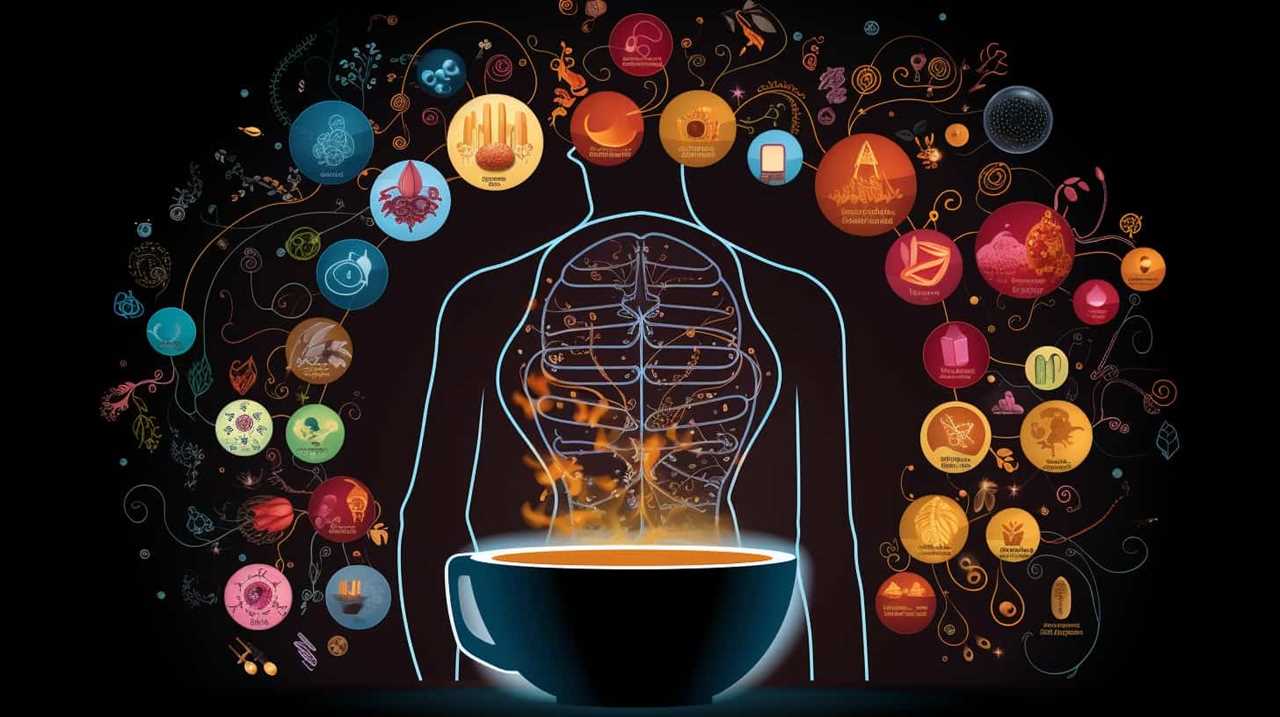
Additionally, getting enough rest and sleep is essential for maximizing performance. Rest allows our bodies to recover and repair, leading to improved muscle strength and endurance.
Mid-Morning Boost
I can’t start my day without a cup of coffee to power through my mid-morning slump. Coffee has long been known for its ability to provide a much-needed energy boost, especially during those mid-morning hours when focus and concentration may start to wane.
Here are four reasons why coffee is the perfect pick-me-up during this time:
- Increased alertness: The caffeine in coffee stimulates the central nervous system, leading to increased alertness and enhanced cognitive function.
- Improved concentration: Studies have shown that coffee can improve focus and concentration, making it easier to tackle tasks and stay productive.
- Metabolism boost: Coffee has been found to increase metabolic rate, helping to burn more calories throughout the day.
- Mood enhancer: Coffee can also have a positive impact on mood, promoting feelings of happiness and well-being.
Afternoon Slump Buster
My go-to afternoon slump buster is a strong cup of coffee, and it never fails to give me the energy boost I need to power through the rest of the day.

However, I understand that not everyone is a coffee lover, and some may be looking for alternative ways to stay focused during the afternoon. Luckily, there are a few options that can provide a similar pick-me-up without the caffeine.
One alternative to coffee is green tea, which contains a moderate amount of caffeine and also provides antioxidants that can support brain health. Another option is matcha, a powdered form of green tea that delivers a more concentrated dose of caffeine and antioxidants.
Additionally, herbal teas like peppermint or chamomile can help relax the mind and improve focus without any caffeine.
So, whether you choose coffee or one of these alternatives, finding a way to combat the afternoon slump is essential for maintaining productivity and focus.

Now, let’s move on to the next topic: the post-lunch pick-me-up.
Post-Lunch Pick-Me-Up
After lunch, I often find myself feeling sluggish and in need of a pick-me-up. That’s when a post-lunch coffee comes to the rescue.
Not only does it provide a burst of energy, but research shows that drinking coffee after lunch can also boost afternoon productivity.
Energy After Lunch
The caffeine in a cup of coffee can provide an amazing energy boost after lunch. It’s no secret that many of us find ourselves in need of a pick-me-up during those post-lunch hours.

When it comes to finding alternative ways to boost our energy levels, there are a few options worth considering:
-
Green tea: With its lower caffeine content and high levels of antioxidants, green tea provides a more moderate and sustained energy boost.
-
Exercise: Engaging in physical activity, such as a brisk walk or stretching, can naturally increase your energy levels and help combat that mid-afternoon slump.
-
Hydration: Sometimes, all we need is a glass of water to rehydrate and refresh our bodies, which can help combat fatigue.

-
Healthy snacks: Opting for nutrient-dense snacks like fruits, nuts, or yogurt can provide a natural energy boost without the crash.
Boosting Afternoon Productivity
I find that taking a short power nap after lunch really boosts my afternoon productivity. Not only does it combat fatigue, but it also gives me a burst of energy and helps me stay focused for the rest of the day.
However, I’ve also discovered another technique that works wonders for boosting creativity and productivity in the afternoon: drinking a cup of coffee. Studies have shown that caffeine can enhance cognitive function and improve alertness, making it the perfect pick-me-up when you’re feeling sluggish.
Just be mindful of the timing, as consuming caffeine too late in the day can interfere with your sleep. So, before a study session or any task that requires mental sharpness, a cup of coffee can provide that extra boost to help you perform at your best.

Before a Study Session
Before starting a study session, I like to fuel up with a cup of coffee. It helps me stay focused and alert, giving me the boost I need to absorb information effectively. However, I understand that not everyone is a fan of coffee or may want to explore alternatives.
Here are some study strategies and coffee alternatives that can provide a similar energizing effect:
-
Green tea: Rich in antioxidants and containing a moderate amount of caffeine, green tea can provide a gentle boost without the jitters.
-
Herbal tea: Opt for caffeine-free herbal teas such as chamomile or peppermint, which can help calm the mind and increase focus.

-
Matcha: This powdered form of green tea is known for its high caffeine content and can provide sustained energy throughout your study session.
-
Dark chocolate: A small piece of dark chocolate can provide a mild stimulant effect and improve cognitive function.
Pre-Work Meeting Energizer
To boost productivity and focus during pre-work meetings, I like to incorporate a quick energizer activity that engages everyone and promotes creativity. One effective activity is a short mindfulness exercise. This can be as simple as closing our eyes and taking a few deep breaths, or doing a body scan to relax any tension.
Research has shown that mindfulness practices can enhance pre-workout focus and mental clarity. By taking a moment to ground ourselves and bring our attention to the present moment, we can clear our minds of distractions and improve our cognitive abilities. This can lead to better concentration, problem-solving skills, and overall performance during meetings.

Late Afternoon Revival
One of my favorite ways to experience a late afternoon revival is by savoring a refreshing iced coffee. It not only provides a delightful pick-me-up, but also boosts my energy and helps me stay focused for the rest of the day. Here are a few reasons why coffee is the perfect choice for late afternoon energy:
-
Caffeine content: Coffee contains caffeine, a natural stimulant that can increase alertness and reduce fatigue. It helps to combat the afternoon slump and keeps you energized.
-
Mental clarity: The caffeine in coffee can enhance cognitive function and improve focus. It helps to sharpen your mind and improve productivity during the late afternoon hours.
-
Taste and enjoyment: Drinking a delicious iced coffee can be a pleasurable experience that uplifts your mood and rejuvenates your senses.

-
Versatility: Coffee can be customized to suit your preferences. Whether you like it black, with milk, or flavored, there are endless options to enjoy your late afternoon cup of joe.
Before an Evening Workout
I often like to fuel up with a cup of coffee before my evening workout to give me that extra boost of energy. But does caffeine really have an impact on exercise performance in the evening? Research suggests that it does.
A study published in the Journal of Applied Physiology found that consuming caffeine before an evening workout can enhance exercise performance. Caffeine acts as a stimulant, increasing alertness and reducing the perception of effort during exercise. It also stimulates the central nervous system, leading to improved muscle contraction and endurance.
However, it’s important to note that the effects of caffeine can vary from person to person, so it’s best to experiment and see what works for you. Remember to consume caffeine in moderation and stay hydrated to optimize your performance and overall well-being.

Nighttime Productivity Enhancer
I’ve always wondered if having coffee at night could actually enhance productivity without disrupting sleep. Is it possible to find a balance between the benefits of caffeine and the need for quality sleep? And if so, what’s the optimal nighttime caffeine dosage to maximize productivity without sacrificing rest?
Let’s explore the effects of coffee on sleep quality and discover if there’s a way to boost productivity during nighttime hours.
Coffee Vs. Sleep Quality
The article explores the effects of coffee on sleep quality and its potential as a nighttime productivity enhancer. Coffee is a popular beverage that many people rely on to stay awake and alert during the day. However, consuming coffee too close to bedtime can disrupt sleep patterns and lead to sleep deprivation. It’s important to understand the impact of coffee on our sleep quality in order to make informed decisions about when to consume it.
Here are a few key points to consider:

- Coffee contains caffeine, a stimulant that can interfere with our ability to fall asleep and stay asleep.
- Consuming coffee several hours before bedtime may still have an impact on sleep quality and patterns.
- Individuals vary in their sensitivity to caffeine, so it’s important to pay attention to personal reactions.
- Opting for decaffeinated coffee or other non-caffeinated alternatives in the evening can help promote better sleep.
Considering the potential effects of coffee on sleep quality, it raises the question: what’s the optimal nighttime caffeine dosage?
Optimal Nighttime Caffeine Dosage?
An article suggests that finding the right amount of caffeine to consume at night for optimal productivity is a topic of discussion.
Nighttime caffeine consumption can have significant effects on sleep quality, making it essential to strike a balance.
Caffeine is a stimulant that can interfere with the sleep-wake cycle, causing difficulty falling asleep and reducing the overall quality of sleep.

It’s recommended to avoid consuming caffeine at least six hours before bedtime to minimize its disruptive effects.
However, individual tolerance to caffeine varies, and some people may be more sensitive to its effects than others.
It’s important to listen to your body and pay attention to how caffeine affects your sleep.
Experimenting with different cutoff times and observing the resulting sleep patterns can help determine the optimal nighttime caffeine dosage for you.
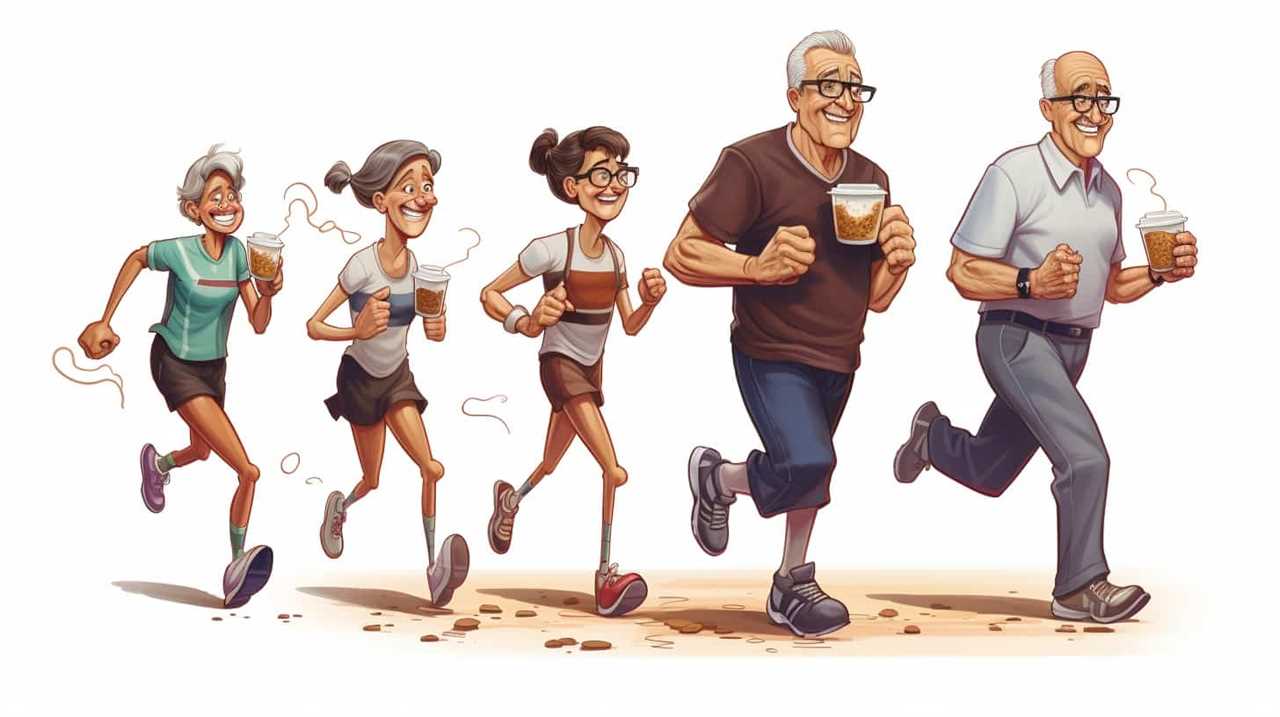
Frequently Asked Questions
Can Drinking Coffee in the Evening Affect My Sleep Quality?
Drinking coffee in the evening can affect my sleep quality. The caffeine in coffee can interfere with falling asleep and staying asleep.
It’s best to avoid consuming coffee close to bedtime to ensure a good night’s sleep. If you’re sensitive to caffeine, it’s recommended to limit your coffee consumption in the afternoon and switch to decaffeinated options in the evening.
Prioritizing a good sleep routine is essential for overall well-being.
How Much Coffee Should I Consume Before a Workout to Maximize Its Benefits?
When it comes to maximizing my workout, I’ve found that timing is key.

Pre workout consumption of coffee can be a game changer. I’ve discovered that having a cup of joe about 30 minutes before hitting the gym gives me the boost I need to push through my exercises with intensity and focus.
It’s like having a turbocharger for my metabolism.
Can Drinking Coffee on an Empty Stomach in the Morning Lead to Digestive Issues?
Drinking coffee on an empty stomach in the morning can sometimes lead to digestive issues. It’s because the caffeine in coffee stimulates the production of stomach acid, which can cause discomfort and even heartburn for some individuals.
To avoid this, it’s recommended to have a small meal or snack before drinking coffee. Incorporating a balanced breakfast into your morning routine can help prevent any potential digestive problems and ensure a smooth start to your day.

Is It Necessary to Drink Coffee Before a Study Session, or Are There Other Alternatives?
When it comes to studying, many people rely on coffee for an energy boost. But is it necessary?
Coffee vs. green tea: which is better for studying? While coffee is known for its stimulating effects, green tea can also provide a gentle, sustained energy boost without the jitters.
Additionally, there are natural alternatives to coffee for an energy boost during study sessions, such as matcha tea or herbal teas like ginseng or peppermint.
It’s all about finding what works best for you.

Are There Any Potential Side Effects of Consuming Coffee Throughout the Day for an Extended Period of Time?
When it comes to consuming coffee throughout the day for an extended period of time, there are potential risks and long-term effects to consider.
It’s important to be aware that excessive coffee intake can lead to increased heart rate, anxiety, and disrupted sleep patterns.
Additionally, dependency on caffeine may develop, causing withdrawal symptoms when trying to cut back.
It’s always a good idea to moderate your coffee consumption and listen to your body’s needs.

Conclusion
So there you have it, the top 10 times to drink coffee for a metabolism boost.
From the moment you wake up to those late afternoon slumps, coffee can be your secret weapon for staying energized and productive throughout the day.
But remember, moderation is key. Too much caffeine can have negative effects on your health.
So enjoy your cup of joe strategically and reap the benefits of a well-timed perk-me-up.

Cheers!
In the vast and diverse world of coffee, coffee alternatives, and tea, Olivia has found her calling. As an author and a dedicated coffee and tea aficionado, her work for Cappuccino Oracle reflects her profound love and understanding of the intricate complexities found within these beverages. Olivia’s passion for the subject serves as both a catalyst for her creativity and a connection point with her audience.
Olivia’s appreciation for coffee, coffee alternatives, and tea blossomed at an early age. She discovered that these beverages invigorated her senses and stimulated her creative spirit. From the nuanced flavors of single-origin roasts to the captivating narratives intertwined with coffee, coffee alternatives, and tea trade and culture, Olivia found an unlimited source of inspiration in her daily cup.
Her love for these beverages and her talent for storytelling eventually converged at Cappuccino Oracle. As an author, Olivia’s mission is to illuminate the intricate tapestry that makes up the world of coffee, coffee alternatives, and tea. Her articles span a diverse range of topics, encompassing everything from the unique flavors of different brews to the sociocultural history intertwined with their cultivation and consumption.
-

 Americano4 weeks ago
Americano4 weeks agoHow Many Calories Are in a Americano
-

 Americano7 days ago
Americano7 days agoHow to Make Americano With Moka Pot
-

 Americano2 weeks ago
Americano2 weeks agoHow to Make an Americano in a French Press
-

 Americano1 week ago
Americano1 week agoHow to Make Iced Americano With Instant Coffee
-

 Americano2 weeks ago
Americano2 weeks agoWhat to Add to an Americano at Starbucks
-

 Americano2 weeks ago
Americano2 weeks agoHow to Make Americano With a Nespresso Machine
-

 Americano6 days ago
Americano6 days agoHow to Make Americano With Bialetti
-

 Americano1 week ago
Americano1 week agoHow to Make Dutch Bros Americano










